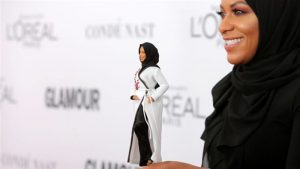
“Olympic fencer Ibtihaj Muhammad holds a Barbie doll made in her likeness as she attends the 2017 Glamour Women of the Year Awards at the Kings Theater in New York.”
Dear reader,
Perhaps Mattel had a different kind of discussion in mind when they released the newest ‘Shero Barbie’ ‚Äì a hijab-wearing Barbie, made in the image of Olympic fencer Ibtihaj Muhammad. Mattel surely expected people, especially women, to praise the inclusive approach, the recognition that hijabi Muslim women are a part of everyday life, and so is their fashion. However, now several women are coming forward, Muslim and non-Muslim, to criticise the most recent addition to the Barbie girl gang. If a hijab wearing woman is glorified for her decision to wear the veil, is she suggesting that the only way to truly live Islam as a female is through this very Barbie? Is Mattel going the wrong way? Instead of empowering Muslim girls, is this Barbie endorsing an oppressive, anti-feminist version of Islam? And moreover, are Muslim girls even pressured into wearing a hijab if their Barbie is?
Cleary, there is a discussion worth having here, but it is not a new one. Barbie’s plastic beauty has always been blamed for imposing unrealistic values on girls: from her body proportions, to her perfect skin tone, and right down to her stylised fashion picks. On the other hand, Barbie also has a biography that shouldn’t be disregarded. Or, to put it differently, as a fellow woman, Barbie shouldn’t be reduced to her appearance. Barbie holds several PhD’s, a driver’s and pilot’s licence, owns many cars and real estate. She was featured in a wheel chair and she also ran for President. Barbie is not married, and has had several relationships (although is now back with her sweetheart Ken) and generally seems to depict a modern, self-determined, independent life.
If hijabi Barbie is all that– a self-confident and fierce woman that goes her own way (be it with a veil or not) then I’m all for it. If Barbie really has this gigantic influence on girls in regard to the self-esteem and the future choices that she has always been criticised for, then this hijabi version is just what young girls need. She is the plastic promise: “You can be me and you. You can wear a hijab and go to University and have a career and non-Muslim friends and Muslim friends without a hijab. It’s your choice.”
We don’t want to be reduced to our appearance – so let’s not reduce others to theirs.
Kristina Kraemer
–Junior Editor
Girl News International
